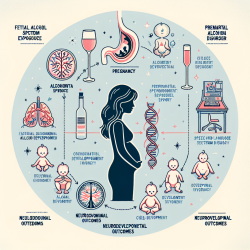Understanding the Impact of Mild Internet Use on Neurotransmission Genes
In a world where technology is omnipresent, understanding the implications of internet use, especially among young individuals, is crucial. Recent research titled "Mild internet use is associated with epigenetic alterations of key neurotransmission genes in salivary DNA of young university students" provides groundbreaking insights into how even mild internet use can lead to significant changes in the epigenetic regulation of genes associated with neurotransmission. These findings are not just academic; they hold the potential to revolutionize therapeutic practices, particularly in child therapy.
Key Findings from the Research
The study investigated the epigenetic and genetic regulation of the oxytocin receptor (OXTR), dopamine transporter (DAT1), and serotonin transporter (SERT) genes using saliva samples from young university students. The Internet Addiction Test (IAT) was used to categorize participants based on their internet usage. Significant changes in DNA methylation levels at these genes were observed, particularly in individuals with mild internet use (IAT scores between 30 and 49), compared to those with lower or higher scores.
- Increased DNA methylation in the OXTR and DAT1 genes was noted in mild internet users.
- A unique pattern of SERT gene methylation was observed, indicating complex interactions between serotonin and dopamine systems.
- These epigenetic changes suggest potential biological markers for behavioral alterations and vulnerability to internet addiction.
Implications for Child Therapy
As practitioners focused on creating positive outcomes for children, these findings can inform our therapeutic approaches. Understanding the biological underpinnings of internet use can help us tailor interventions more effectively. Here are some ways to apply these insights:
- Early Detection: Use knowledge of genetic markers to identify children at risk of developing internet-related behavioral issues.
- Personalized Interventions: Develop personalized therapy plans that consider the child's genetic predispositions and internet usage patterns.
- Parental Guidance: Educate parents about the potential impacts of internet use and strategies to mitigate risks.
Encouraging Further Research
This study opens the door to further exploration into the genetic and epigenetic factors influencing internet use and addiction. As practitioners, staying informed about ongoing research can enhance our practice and improve outcomes for the children we serve. Consider collaborating with researchers to explore these findings in younger populations and different contexts.
To read the original research paper, please follow this link: Mild internet use is associated with epigenetic alterations of key neurotransmission genes in salivary DNA of young university students.










